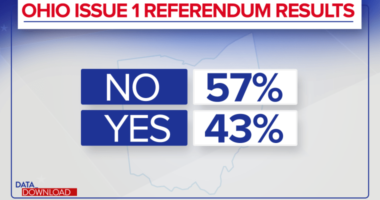
Rivals Gilead Sciences Inc. GILD -1.31% and Merck MRK 0.84% & Co. are joining forces to develop a long-acting HIV therapy, the next frontier in treating the disease.
The big drugmakers said Monday they had agreed to explore whether a combination of two experimental drugs, which the companies had been researching separately, could treat HIV even if taken every several months.
Patients and investors have been closely watching the development of the two cutting-edge HIV agents, Gilead’s lenacapavir and Merck’s Islatravir.
The pairing, if proven successful in testing could further HIV treatment’s shift into a new phase that doctors hope will reduce the number of patients with detectable disease while limiting new cases.
GlaxoSmithKline GSK -0.03% PLC’s ViiV Healthcare recently began selling the first-long acting HIV treatment, a once-a-month injection. Gilead and Merck want to see whether patients could take their drug cocktail months apart.
“ “It’s a big deal for people living with HIV” ”
“It’s a big deal for people living with HIV,” said Gilead Chief Executive Daniel O’Day. “It has the potential to bring a long-acting medicine as much as two years earlier than if we didn’t have our companies working together.”
Gilead and Merck expect to begin testing in people a pill version of the combination during the second half of this year, which Mr. O’Day said in an interview could be approved as early as 2025 if it passes testing.
The companies expect to begin studying an injectable form of the cocktail next year, and it could be ready for approval in 2027.
It is unusual for rivals like Merck and Gilead to team up in the development and commercialization of combination HIV therapy, though the companies have shared commercial rights.
Some 1.2 million people in the U.S. had HIV in 2018, according to the latest figures from the Centers for Disease Control and Prevention. That year, nearly 38,000 new cases were diagnosed.
Some 38 million people had HIV/AIDS world-wide in 2019, and 1.7 million people were newly infected with the virus.
HIV causes AIDS. Drugs have turned an HIV infection, which once provided a near certain death sentence, into a manageable chronic disease, while providing billions of dollars in yearly sales to their makers.
Gilead and Merck are among the companies selling pills that patients can take once a day. So does ViiV, which is majority owned by GlaxoSmithKline and counts Pfizer Inc. PFE 0.66% and Japan’s Shionogi 4507 2.01% & Co. as shareholders.
The once-daily pills can clear so much virus that tests can’t detect it. Yet about four in 10 HIV patients in the U.S. and world-wide have detectable virus, the CDC said.
Some people don’t know they are infected, and others aren’t getting regular care or can’t afford it. Another factor, doctors say, is patients don’t take their pills every day.
STAY INFORMED
Get a coronavirus briefing six days a week, and a weekly Health newsletter once the crisis abates: Sign up here.
Long-acting drugs, doctors say, would be easier for patients who have trouble keeping up the daily regimen or who skip doses to avoid being seen taking an HIV medicine.
“That really does help improve adherence,” Merck Chief Executive Kenneth Frazier said in an interview.
The companies are longtime competitors in HIV and other diseases. Gilead, of Foster City, Calif., reported $16.9 billion in HIV drug sales last year, while Merck, of Kenilworth, N.J., notched more than $857 million.
Gilead and Merck researchers had separately been working on the two long-acting agents and studied them individually in late-stage trials.
Both drugs block HIV from making copies of itself but in multiple different ways. Lenacapavir attacks the virus when it infects a cell and when replicas are leaving an infected cell. Islatravir, which Merck licensed from Japan’s Yamasa Corp. in 2012, stops the virus from copying its genetic material and disrupts a later stage in its replication process.
Researchers seeking to treat HIV combine antiviral drugs to overcome any resistance a virus might develop that would allow it to elude a single drug.
The HIV collaboration between Gilead and Merck covers the development of pills and injections made from the combination that treat infections, Messrs. O’Day and Frazier said.
Under the terms, Gilead and Merck would share the development and commercialization costs of the drug cocktail, the companies said. Gilead would cover 60% of the costs, while Merck would pay for the rest.
The companies would split yearly global sales up to $2 billion for a pill and $3.5 billion for an injection. After reaching those milestones, Gilead would take 65% of sales, with Merck getting the remainder.
Each of the experimental drugs could prevent HIV infections operating alone, and the companies can pursue such prophylactic uses individually.
Write to Jonathan D. Rockoff at [email protected]
Copyright ©2020 Dow Jones & Company, Inc. All Rights Reserved. 87990cbe856818d5eddac44c7b1cdeb8








